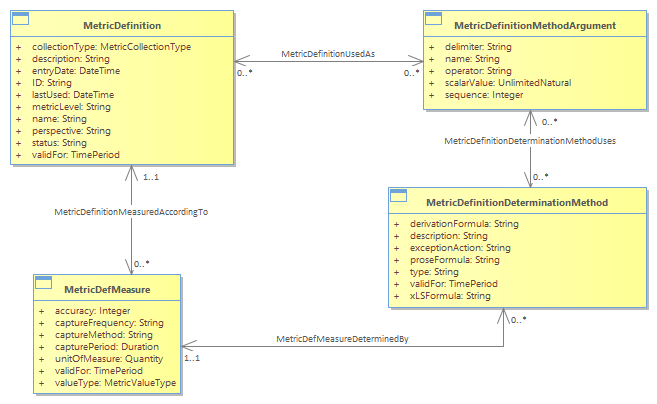
Figure Me.02 - Metric Definition Measure : Class diagram
| Created: | 3/28/2022 3:51:09 PM |
| Modified: | 6/9/2022 1:58:09 PM |
 Project: Project: |
|
 Advanced: Advanced: |
Metrics may be calculated in a number of different ways from a simple ratio to a complex expression. Figure Me.02 – Metric Definition Measure shows the entities used to calculate a metric value.<br/>A MetricDefMeasure specifies a measure of a specific aspect of an entity, such as lost packets or dealer sales target achievement.<br/>A MetricDefinition may have many MetricDefMeasures. One example of many is that one measure may be in Fahrenheit and another may be in Centigrade.<br/>Two entities, MetricDefinitionDeterminationMethod and MetricDefinitionMethodArgument support the requirement of different ways to calculate Metrics. <br/>Basic facts about the method, such a type (ratio, sum, and so forth) are contained in the MetricDefinitionDeterminationMethod.<br/>The arguments that represent the expression are contained in one or more MetricDefinitionMethodArgument. An argument may be the same or another MetricDefinition. <br/>For example, a simple ratio of metric definition A divided by metric definition B would be represented by two instances of the arguments. The numerator would be related to metric definition A with a sequence of 1 and an operator of “/”. The denominator would be related to metric definition B with a sequence of 2.<br/>The delimiter attribute, such as “(“and“)”, enables more complex expressions. For example (metric definition A + metric definition C).<br/>When an expression is too complex to represent using the arguments, such as one that includes logic and using other entities) the derivationFormula attribute can contain a reference to logic (code) that performs the calculation.<br/>Remark: An implementation of the model may choose to share same determination method for many metric definition measures. If this is the case then the association would be changed to *-*.<br/>